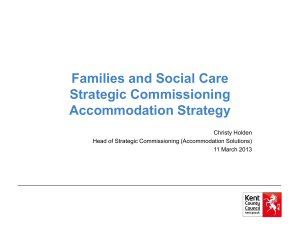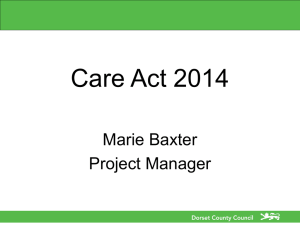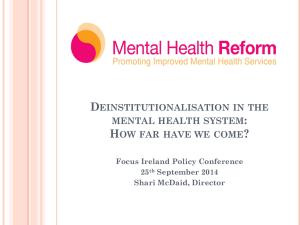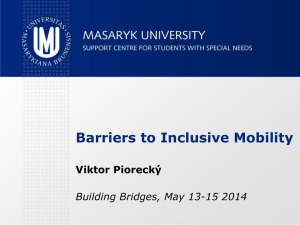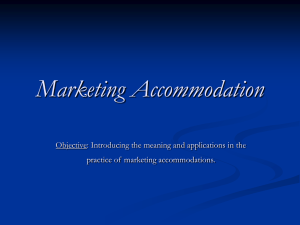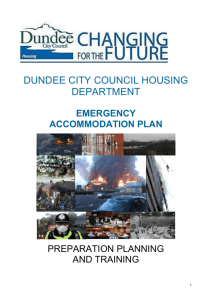Supported Accommodation Presentation
advertisement
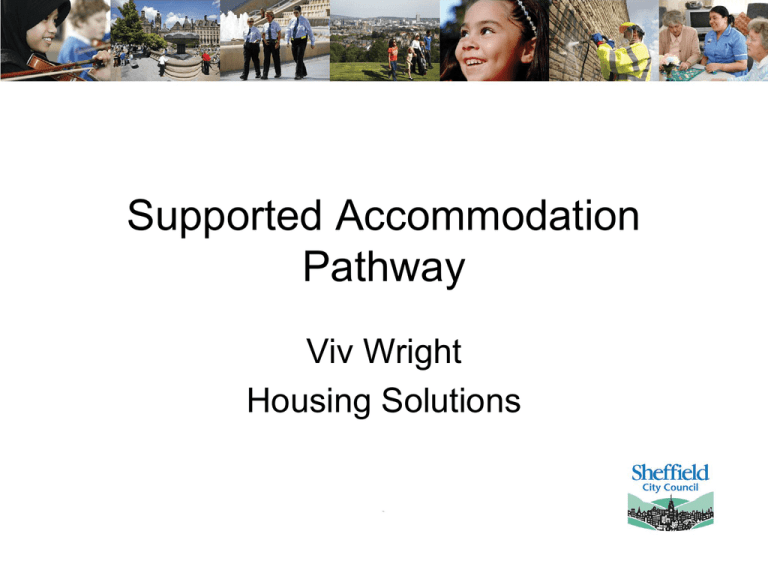
Supported Accommodation Pathway Viv Wright Housing Solutions Why a Supported Accommodation Pathway • Large numbers of single homeless in B&B • Only accommodate those investigating as statutory homeless therefore likely to have support needs • Not using temporary accommodation appropriately • Little supported accommodation for families • Review: developed temporary accommodation rather than supported accommodation for homeless Homeless Link Why? • Independent analysis and consultation What they did? • Review of relevant strategies and related documents • Audit and analysis of data about use and users of temporary accommodation and supported accommodation using MOPP toolkit, online and telephone consultation and client focus groups • Consultation with providers, key stakeholders and commissioners • Review and analysis of the balance between temporary and supported accommodation in meeting needs of customers • Review of current data collection • Review of pathway models currently in place across UK with key learning points • Identification of ICT requirements for recommended option Key Findings: Customers • Access is unfair • Perceived as negative, unsupportive and judgemental • Lack of consistency about who gets what • Limited options to access housing • Want to see a holistic approach to support to meet the full range of needs as a result of the pathway Key Findings: Other Stakeholders • Stakeholders, commissioners and most providers support concept of a pathway particularly consistency and fair access • Concerns that it might be complex, bureaucratic and inflexible • Need for number of sub-pathways e.g. families, MH, YP • Information about accessing services is inconsistent and there is little centralised data • Need for access to wide range of move on including private rented and complex needs • Many return to family or previous home or make an unplanned move – highlighting need for positive interventions • Move on linked to individual support plans but little evidence addressing tenancy sustainability e.g. specific resettlement training • Visits to Newcastle and Sunderland In Summary The pathway approach for Sheffield needs to: • Increase clarity • Create equality of access • Result in a common approach • Improve data capture and information sharing • Support effective and appropriate assessment • Take a holistic approach to customer needs • Ensure that supported accommodation is being accessed by those who need it most • Improve the customer experience • Increase access to preventative interventions and nonaccommodation focussed support • Strengthen commissioning Recommendation • Option 1 – Status quo • Option 2 – Minimal, by ending self referral and using single access point at Howden House • Option 3 – Minimal, by ending self referral and using an agreed assessment process at multiple access points • Option 4 – Single Access Point Housing Pathway – Skilled and trained team undertake all assessments with improved options and new ICT Option 4 recommended • Business case written and agreed by PLT+. Option 4 being developed with tweaks after further consultation What we have done so far • Implemented young people pilot pathway for 16 & 17 year olds which includes joint assessment and assessment beds at 3 projects • Converted 2 temporary accommodation projects for families to supported accommodation • Increased units at Complex Cases Project • Assessment beds at St Anne’s Bevin Court • Further assessment beds to be rolled out at Salvation Army and St Anne’s • Enhanced Housing Options in Housing Solutions • New HIS contract for homeless prevention and resettlement • March 12 2012 – no homeless households in B&B Draft Vision Customer Journey Homeless Non Accommodation Service - Advice Services - First Point - Day Centres - Statutory Services - Specialist Services Settled Assessment Accommodation Trained Assessor: e.g. - Housing Solutions - Mental Health - Offender Management - Emergency - Assessment - Supported - Private Rented - Social Housing - Advice & Assistance Resettlement - Private Rented - Social Housing Day/Floating/Support Services Engagement Basic - Safety - Food - Health - Clothing Confidence and Motivation through activities e.g. Arts, Sports Development Moving On Personal Development: - Skills building - Cutting down drink/drugs - Relationships - Social network Accessing mainstream accommodation: - Volunteering courses - College/University - Job training/work - Self Directed Support v.1.2 Next Steps • • • • • • • • • • Customer Journey Common Language Common Assessment Policy and Procedures Training Phase 1 Phase 2 Further Consultation Underpinned by ICT Leading to implementation

